
Mumbai, Aug 14 (IANS) Stars: **** (4 stars), Director – Arun Gopalan
Cast – John Abraham, Neeru Bajwa, Manushi Chhillar, Hadi Khajanpour
Duration – 118 Minutes
‘Tehran’ fires on all fronts, a gritty, grounded thriller where politics, pain, and patriotism collide. ‘Tehran’ is a gripping geo-political thriller rooted in the real events of the 2012 attack on Israeli diplomats in India — and it doesn’t shy away from showing the messy, murky world of global politics.
From the very beginning, it makes it clear that this isn’t going to be a simple good vs evil narrative. Instead, it plunges headfirst into the grey zones of diplomacy, espionage, and personal loss.
The story kicks off with a sobering voiceover about the long-standing tension between Iran and Israel, and how decades of covert attacks and retaliations have shaped political strategies behind closed doors. A bombing in Delhi sets off the central plot, injuring many and killing a flower-selling girl. It’s a haunting moment — one that instantly grounds the film in painful reality. DCP Rajeev Kumar (John Abraham), part of Delhi Police’s Special Cell, is put on the case. But this is more than just another assignment for him — he knew the girl. For Rajeev, this is deeply personal.
With Tehran, John Abraham takes on one of his most politically charged and performance-driven roles to date. And he delivers. This is not the loud, chest-thumping action hero we’ve often seen him play. Instead, John embodies a man of few words, weighed down by duty, anger, and helplessness. He brings a quiet intensity to Rajeev, portraying the emotional trauma and moral confusion that even the most capable officers face in the wake of such violence. It’s one of his most committed and nuanced performances in recent years — a reminder that silence can sometimes speak louder than a scream.
Manushi Chhillar, as SI Divya Rana, has limited screen time, but her role is pivotal to the plot’s twist. She may not be the loudest character, but her presence is undeniable, and her contribution to the narrative leaves a lasting impact. It’s a smart bit of casting, and she fits well into the film’s grounded, realistic tone.
Neeru Bajwa plays Sheilaja, a diplomat navigating the sharp edges of international diplomacy. She exudes both elegance and authority, her performance adding gravitas to the film’s political canvas. Her look and styling are sharp, and she embodies the kind of poised complexity that’s often required in such roles — someone who knows far more than she lets on.
And then there’s the antagonist. Hadi Khajanpour plays the suspected terrorist Asraf Khan with chilling precision. He is menacing without ever becoming a caricature. The performances of the antagonists overall are so convincing that you’ll find yourself truly despising their characters — a testament to the strength of the casting and direction.
What sets Tehran apart from many commercial thrillers is its refusal to oversimplify. The screenplay (by Ritesh Shah, Ashish P. Verma, and Bindni Karia) strikes a balance — delivering tense sequences and dramatic confrontations while sensitively handling the very real and politically loaded topic of the 2012 attacks. There’s nuance in how the film depicts India’s position — caught between global powers, trying to maintain neutrality while also seeking justice. The writing doesn’t lecture — it informs, through dialogue and tightly wound scenes that keep you on edge.
The action sequences are at par with international standards — crisp, believable, and never needlessly over-the-top. Each explosion, chase, and standoff is grounded in realism, which raises the stakes. These are not superhero-style set pieces — they’re brutal and tense, just as they would be in the real world.
Visually, Tehran is stunning. The cinematography by Ievgen Gubrebko and Andre Menezes is nothing short of brilliant. Whether it’s the dusty streets and dimly lit chawls of Delhi or the cold, desolate landscapes of Abu Dhabi, every location has been framed to reflect the mood of the characters. The colour grading subtly shifts with the narrative — warm and familiar in Rajeev’s home life, stark and unsettling during operations abroad. It adds depth without ever calling attention to itself.
The music by Ketan Sodha does its job quietly — enhancing the tension, underscoring the emotion, but never overwhelming. Akshara Prabhakar’s editing keeps the film tight and steady. It never drags, even as it allows emotional beats to land with weight.
A standout element in the second half is when Rajeev goes rogue. With the Indian government hesitating for diplomatic reasons, Rajeev’s mission becomes personal and unofficial. This shift in tone adds urgency — and highlights just how thin the line is between right and wrong in the world of espionage. Every choice feels risky. Every move feels like it could backfire.
Another strength of the film lies in its characters. The director gives importance to each and every role, even those on the periphery. Their stories and motives are relevant, layered, and never feel tacked on. Whether it’s Rajeev’s tender scenes at home, or side characters with their own agendas, the film treats its ensemble with respect.
Ultimately, what makes Tehran resonate is its refusal to wrap things up too neatly. It understands that in real-world conflicts, there are no clean victories. It’s a film about flawed people doing what they think is right — or what they’re told is right — in a world that doesn’t always reward honesty or courage.
Produced by Maddock Films and Bake My Cake Films, Tehran may not be a film for everyone. Some may find the pacing slow in parts, and certain characters could have used more development. But for those who enjoy intelligent thrillers rooted in reality — with global stakes and emotional weight — this one delivers. It’s bold, serious, and very much worth watching.
Streaming exclusively on ZEE5.
–IANS
aa/



